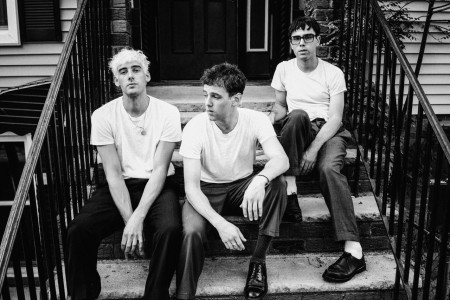Interview: Skaters’ Michael Ian Cummings

In their short time of being a band, Skaters have already witnessed the highest highs and the lowest lows of the music industry. After signing with Warner Bros. Records, the band released their energetic debut Manhattan before things started falling apart. The band was dropped by their label and became “the cliché 90’s band”, as lead singer Michael Ian Cummings likes to put it. Many bands facing this situation would pack it up or suffer an identity crisis, but the separation has seemingly had no effect on Skaters’ music. The band released a new demo online for each day of December, a catchy new song “Head On To Nowhere” in January, and are getting ready to release new music later this year. We reached Michael Ian Cummings at home in New York City:
Northern Transmissions: I really like the new song “Head On To Nowhere”, what does the song mean to you?
Michael Ian Cummings: It was kind of about this feeling that I think a lot of people share where you’re just not really content with being anywhere in particular, and if it was possible you’d rather be nowhere.
NT: I couldn’t find the demo of it in the December series you put online.
MIC: Those demos were all songs that aren’t going to be on the upcoming record. I just kind of wanted to showcase some stuff because it’s been a while since we put out music. I didn’t want to put out the new record so soon, it was mainly a treat for the fans. Those demos shouldn’t really be taken as any reflection of our music coming up. I don’t think they’ll ever end up anywhere, we throw away so many songs, it’s just crazy.
NT: What was your inspiration for the “Head On To Nowhere” video released last week?
MIC: Well we realized that most of what we do as a band is really just sitting around, so we decided to film ourselves sitting bored on the couch. People don’t realize how much sitting and waiting we do, whether it’s on tour waiting for a show, or waiting for your record to come out that you finished a year ago, or waiting for a new label. It was an opportunity for us to poke fun at the fact that we know our fans are anxious and have been waiting for a record for a long time. We also wanted to kind of make fun of the state of our place in the music industry, having become one of those 90’s cliché bands that was dropped by a major label and seeing things fall apart around you. It was a tongue in cheek look at our band’s history.
NT: It’s been a little while now, but what was the main reason for the split from Warner Brothers Records, and are there still any bitter feelings?
MIC: Well it’s kind of a complicated thing. I’m not totally bitter because I think they did really wonderful things for us that we couldn’t have done on our own. Just having access to the pocketbook of a company like that is incredible for any band. The aspect of it that I wasn’t happy with had more to do with how the label operated, and how difficult it was to get anything done. It all seems kind of crazy because you have the money to do lots of things and the people to work it, but the only hard part is getting people to actually make any decisions. Decisions at these companies become a very personal thing, and if something goes wrong it’s their head. That’s sort of the environment that they’ve created at major labels, where people can’t take risks because they’re in constant fear of losing their jobs. It really puts new eager bands like us in a weird position because we have to get the clearance from all of these people to do anything creative, and they all have their own idea of how things are supposed to go.
You have to listen and work with the company, but the result of the process is that certain things go through the machine and don’t come out the way you want them to. For example, our first single didn’t fucking get released. When they put out the record [Manhattan], they released a song to radio that was supposed to be a warm-up song that we specifically said we didn’t want as the single. Without much radio play, the song did surprisingly well. It was in the Top 50 commercial alternative charts or something like that, which was cool. Then when it was time to release the single we actually wanted, they decided that we ran out of our radio budget. It just leaves you slack-jawed. Like, what are you talking about? That was our single. Unfortunately you run into stuff like that all the time.
You think things are going to work out, but it’s just too many layers of people that you have to get through. When you finally think that you’ve reached the right person, they tell you that the people who make the real decisions are the financial people; so this model is not going to ever work for us or any new bands. It just won’t work. You’re just playing the lottery.
NT: Have you ever seen the Terry Gilliam movie Brazil? That’s what this sounds like to me, a constant maze of people directing you to nowhere.
MIC: Yeah, it’s exactly like that! You can spend days just going in and out of meetings and it’s totally crazy. I don’t know how they operate on this model, it’s like dinosaur shit. It’s weird because I liked a lot of the people, and I think that they hire a lot of people who really love music, but if they could speak freely they would probably tell you that the machine doesn’t work anymore. From my personal experience, no one that we worked with is still there. Everyone was fired.
NT: Let’s say another record company decided to approach you, would you sign with them? Have you lost your faith in all major labels from the split?
MIC: I haven’t lost all of my faith. I wouldn’t choose to sign with a major if I had the choice, but if the investment was really good I think the second time around we’d know exactly where to spend the money and where to fight the label. But having said that, I don’t have any interest in fighting a label right now. I’d rather work with someone that wants to work with us and do it the way we want to do it. It’s really hard to say, because everything starts off peachy in those relationships. It all starts off real smooth and it feels like everyone’s on the same page for a long time, and then it slowly falls apart. You never know, I’m not fully opposed to ever go back to a label, but I doubt any major labels are chomping at the bit to sign us right now.
NT: The last album Manhattan was based on stories from the city. Will the new album be as thematic?
MIC: Manhattan was borderline a concept record. It was almost a reflection of what we did when we came to New York City and started the band. We all moved here at different times, and then wrote this record about a kid moving to New York and getting disillusioned. Thematically, the new album is more about the sound of the record, and there are some personal tales. It’s less about one thing I would say, it’s not about New York anymore.
NT: Have you grown disillusioned with the city?
MIC: No I haven’t. I still love New York City and I don’t think I’ll move. New York is a constant source of inspiration, and it has been forever for a lot of different people. Sure, the city is changing, but you can’t get bitter about that. You have to see where you fit in with the change, and if you’re not willing to change then you’re a dinosaur.
There was an interesting podcast I listened to about a woman who wrote a book on St. Mark’s Place. She asked a hundred people what the best era was to live in St. Mark’s Place, and everyone’s response was the same. Not the same years, but everyone’s response had the same thing in common in that the best years they described were when they were at their peak. So essentially everyone said the best time to live here was when they were in their 20’s, and that really sums it up. A lot of the complaints about the gentrification of the city are true, but a large part of it really is, “you’re getting old and you’re not in your prime”.
Everyone thinks things were better when they were in their 20’s, and that’s not a valid fucking point. Things were different, sure, and they might have been better for you; but some kid right now is living his heyday, and someday he’ll say the best time to live here was 2016. You have to be aware that the city can either keep you young, or you can become an old has-been. I’m trying to choose to stay young and not become a curmudgeon.
NT: What are the release plans for the new music?
MIC: I think we’re leaning on putting out an EP to warm up the new record, but I’m not sure yet. We haven’t really solidified our release plans yet. We intended to write and record two records, and now we have two album’s worth of songs recorded, but we can’t afford to mix them all. We’re kind of in a weird position where we have a ton of material and don’t know what order to put it out in.
NT: On Twitter you’ve been very active tweeting about the American election. Are you worried about the outcome of this election?
MIC: Hell yeah I’m fucking worried! If we elect any of these radical assholes into office our lives are going to get incredibly worse. You’re going to see the 1% get even more of the wealth in this country and there’s going to be mass poverty. Everyone’s going to be living hand to mouth. The old-school punk “fuck the system” mentality doesn’t make sense, if you don’t vote you’re an asshole. If you had the real punk mentality you would give a shit and fight for something good. Anarchy is a copout, it’s like a kid saying that everything sucks as the basis for their arguments. Also, it’s really hard to feel connected to the rest of the country when you live in New York, because everyone has to face the same reality that integration lives here. People of all cultures and classes live side-by-side and have to ride the same subways and buses. I have no idea where these right-wing Republican policies come from. If I can remind 20,000 people on Twitter to vote and prevent one of these assholes from winning, then I’ll fucking do it.
Top Five Favourite Albums
1. John Lennon – Plastic Ono Band
2. Beach Boys – Pet Sounds
3. The Clash – London Calling
4. The Kinks – The Kinks are the Village Green Preservation Society
5. David Bowie – The Rise and Fall of Ziggy Stardust
Interview by Stewart Wiseman
Latest Reviews
Tracks
Advertisement
Looking for something new to listen to?
Sign up to our all-new newsletter for top-notch reviews, news, videos and playlists.








